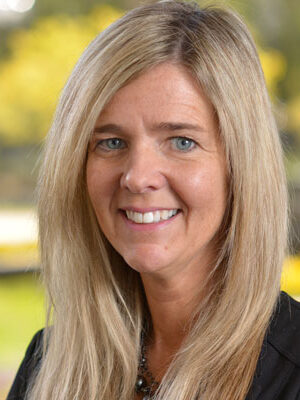UM-Flint receives $746K grant to operate as a regional hub for digital resources and education

Consider all the ways you use technology in your daily life. Bills are paid online. Job searches are conducted on the internet. Earning a college degree is just a Wi-Fi connection away. Family members half the world apart are able to stay in touch thanks to modern connectivity. However, imagine if these digital resources weren't at your fingertips. It would severely limit your quality of life and future prospects. Now, thanks to a $746,000 grant, the University of Michigan-Flint will be a key partner in ensuring the state's underserved communities have access to and training in these essential tools.
UM-Flint's Office of Economic Development is now a regional hub for the Michigan Inclusive Training Technology and Equity Network program, aka MITTEN. The hub will serve communities in Michigan's Prosperity Region 6, encompassing Genesee, Huron, Lapeer, St. Clair, Sanilac, Shiawassee and Tuscola counties. Led by the Michigan High-Speed Internet Office and funded by the Bipartisan Infrastructure Law and the Digital Equity Act, this initiative advances the Michigan Digital Equity Plan and promotes digital inclusion statewide through regional coordination, digital training and support for underserved communities.
OED was awarded $746,405 through a competitive grant process aimed at providing institutions with resources to become regional hubs that offer digital skills training, device distribution programs, affordable internet service and more. The grant will be used to fund a variety of initiatives, such as research into areas of the community where digital access is scarce or focused grants that allow the university to support community partners who are critical to MITTEN resources.

"Closing the digital divide has many components: providing reliable and affordable broadband connectivity, access to technology and digital literacy," said Paula Nas, UM-Flint OED director. "UM-Flint's MITTEN programming focuses on this third component by offering digital literacy training to help individuals develop the digital skills needed to effectively use technology. As an institution of higher education, we are grateful for the opportunity to provide a wide range of digital skills offerings to residents of all ages throughout the region."
As part of these initiatives, OED will digitize its current suite of digital finance, entrepreneurship, and economics educational materials to make them more available throughout the state. The department will also hire a regional digital coordinator through the American Connected Corps, who will work closely with regional partners to assess the region's digital literacy needs.
MITTEN partnership activities on campus are not limited to OED. The Center on Aging, for example, will utilize MITTEN funding to improve research on digital accessibility and literacy for senior citizens.
"The MITTEN grant will help support the UM-Flint Digital Divide research team to teach older adults how to best use internet technology," said Sheryl Groden, assistant professor of social work and co-chair of the Center on Aging. "The interprofessional Digital Divide team – comprised of faculty from social work, occupational therapy and public health – has worked with older adults in Genesee County and the MITTEN grant will allow us to expand the training to older adults in an additional six counties throughout Michigan."
Nas emphasized that partnership is the key to success in initiatives such as this – OED has earmarked more than half of the funding for community and campus organizations.
The efforts of UM-Flint's Center on Aging to improve digital literacy in older adults will be bolstered by MITTEN funding, as well as GST Michigan Works!, which will use its funding to expand upon existing digital literacy training programs available at each of its six-county America's Job Centers in the Flint region. "These and many more funds have been allocated to work alongside community organizations in the region to expand upon the impactful work they are doing to address the digital skills gap," said Nas.
For more information on MITTEN, visit Michigan's Department of Labor and Economic Opportunity website.
- Administrative
- Business & Finance
- Campus Initiatives & Reports
- Career Development
- Community
- Education
- Educational Opportunity Initiatives
- News Releases
- Online and Extended Learning
- Research
- Social Work
- Technology
- University Center for Community & Economic Development
- University News
- University Outreach
Tobias Kind
Toby Kind is the media relations assistant for the Office of Marketing and Communications. He can be reached at tobykind@umich.edu.
